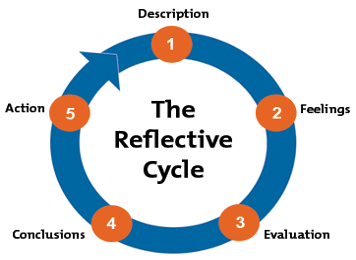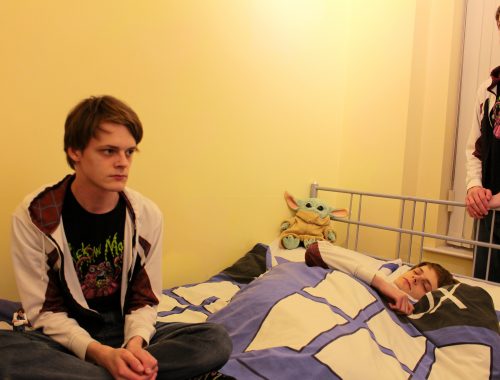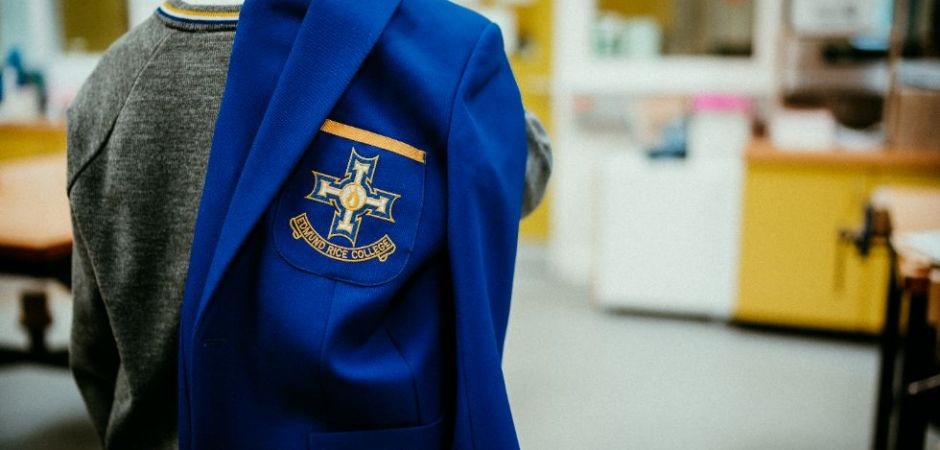‘Alright Sir!’ – From Student to Teacher
The six month COVID “summer” was coming to an end and it was time to start my placement at Edmund Rice College, Glengormley. After a phone call with the head of English, my fate was sealed. Edmund Rice is a local secondary school, and I knew the pupils were a mixed bag of capabilities, however I believe this only further enhances the placement. I will use Gibb’s Reflective Cycle throughout this blog to evaluate the challenges faced in my first few weeks of placement. I chose this technique as Gibbs himself says “it is not sufficient simply to have an experience in order to learn. Without reflecting upon this experience, it may quickly be forgotten” (Gibbs 1998).
‘Teachers are now called upon to work with more and more [pupils] with more and more problems’
(Canter and Canter, 2001).

On my first day I knew straight away that I was going in at the deep end, but that’s what I wanted. I was working with Michelle Cust, the head of the department, and she told me after a few weeks of shadowing, I would be able to take her Year 12 poetry class and her Year 8 class. Although I worked with her Year 9, 13 and Year 8 drama class, these two classes of the week were set aside for ‘Mr. Cunningham’, a daunting, but exciting prospect. Going into the classes I knew the importance of lesson planning, “To start with, you need to know what you are teaching, why you are teaching it and what you expect the pupils to learn in your lesson” (Green 11).
I had my plans all sorted, Year 8 were doing a comprehension, followed by a fun postcards activity (maybe fun is a strong term but they enjoyed), as shown below, and my poetry class were studying Alfred Tennyson’s The Charge of the Light Brigade, analyzing the poem to be able to complete a few PEE paragraphs. This being my first class, I had a presentation made for the poem, exploring contexts and language features, in other words too much spoon feeding. I tried to get class involved, but they were more interested in copying my notes from the slide show rather than what I was saying, with a chorus of groans echoing out every time I moved slides.



Any nervous feelings I had disappeared after my first period year 8 class. Nothing prepared me for my first “Excuse me, Sir”, strange being at the other end of that interaction. I felt the class was a massive success, for my first proper lesson, the comprehension calmed them down, and the postcards felt like a reward, even though it was still improving their literacy. I had put Greens class metaphor of “The Starter, The main and the plenary” (12) into action and felt like the lesson benefited from a regimented structure. Bonus feeling of pride when I overheard “I hope Mr. Cunningham takes all of our English classes”. The older class however, less of a success. I felt deflated at the end of the class. Nobody spoke. I know now that was my fault, and built off my stuttering start. The experience of my first few classes showed me how to calm and work with my Year 8s. On the flip slide it showed me exactly what not to do with a Year 12 class that would get me to sit their GCSEs if they could.

What will I now do differently? After reading Andrew Greens Teaching English in the Secondary School, I spotted my exact predicament in his ‘Teaching Poetry’ section. It was all good I was telling these kids that Tennyson was using a metaphor, but they couldn’t spot one, or maybe they can spot a metaphor, but have no idea what it means (71). That was my issue. I had to make a lesson in such a way that they had to interact and understand in order to fully analyse a poem. In doing so I was Becoming a Reflective English Teacher, following Andrew Greens theory, as shown in figure 1.1.



Examples of The Charge of the Light Brigade PEE Paragraphs.
My first teaching experience has taught me a new approach with tackling a stubborn Year 12 class, an approach that draws out their best work, but is also enjoyable and interactive. Seamus Heaney said “What I heard made sense” in his Inspired paper, and that is how poetry is meant to be taught. Through listening. “Just think for a moment. What pictures come into your mind”, by reading or playing audio of a poem the class are prompted to visualize what going on within the poem (Gordon 2015). From now on I will play poem allowed to make the pupils aware of rhythm, rhyme and literary devices. I will still explain the different types of devices used, but I’ve learnt from my mistake of spoon feeding them devices. If they can’t pick out poetic techniques what’s the point? My lessons will now be structured around the listening of the poem, then breaking into smaller groups, each looking at an individual stanza. This will allow for each pupil to explore and understand a poem, and unlike before, with everyone working in smaller groups I can work with pupils individually if they are struggling. It also incorporates peer learning, as every group will have to report their findings back to the class and we will analyze the poem together. Ultimately, I have learnt that giving the class everything they need to know doesn’t work, and through reflection I now know that in order to get every pupil involved the best approach is working in smaller groups. The learning outcome is the same, but identifying poetic techniques on their own is setting them up better for their GCSEs, and they will interact and take part in my lesson. Making the mistake of spoon feeding the class was a vital step and learning curve on my way to becoming the teacher I want to become. This experience from my first week will be invaluable as I continue to lesson plan and take poetry in my placement.
Bibliography:
Canter, L. and Canter, M. (2001) Assertive Discipline: Positive Behavior Management for Today’s Classroom . Third edition. Denver, CO: Canter & Associates.
Gibbs, G., 1988. Learning by doing. Oxford: Oxford Centre for Staff and Learning Development, Oxford Brookes University.
Gordon, J. (2015) Teaching English. Los Angeles: SAGE.
Green, Andrew, and Newman, Ruth, eds. A Practical Guide to Teaching English in the Secondary School. London: Taylor & Francis Group, 2012.
Green, Andrew. Becoming a Reflective English Teacher, McGraw-Hill Education, 2011.
Heaney, S. ‘The Power of T. S. Eliot’, in Boston Review (Oct. 1989) [“Influences” column]
You May Also Like

Facing Avoidance
26 November 2021
Learning from experience- Am I on the right track?
28 November 2021


